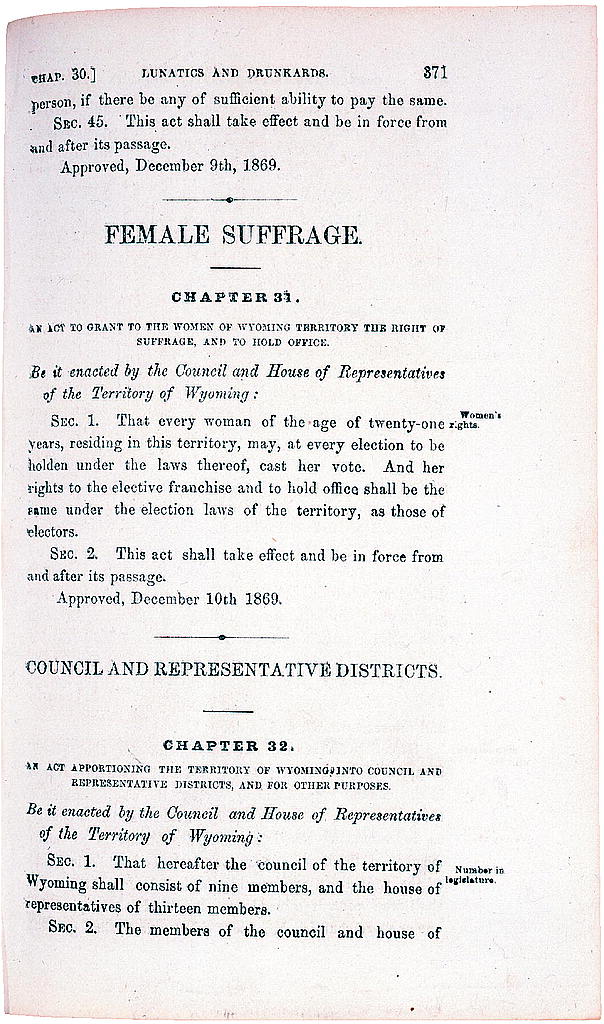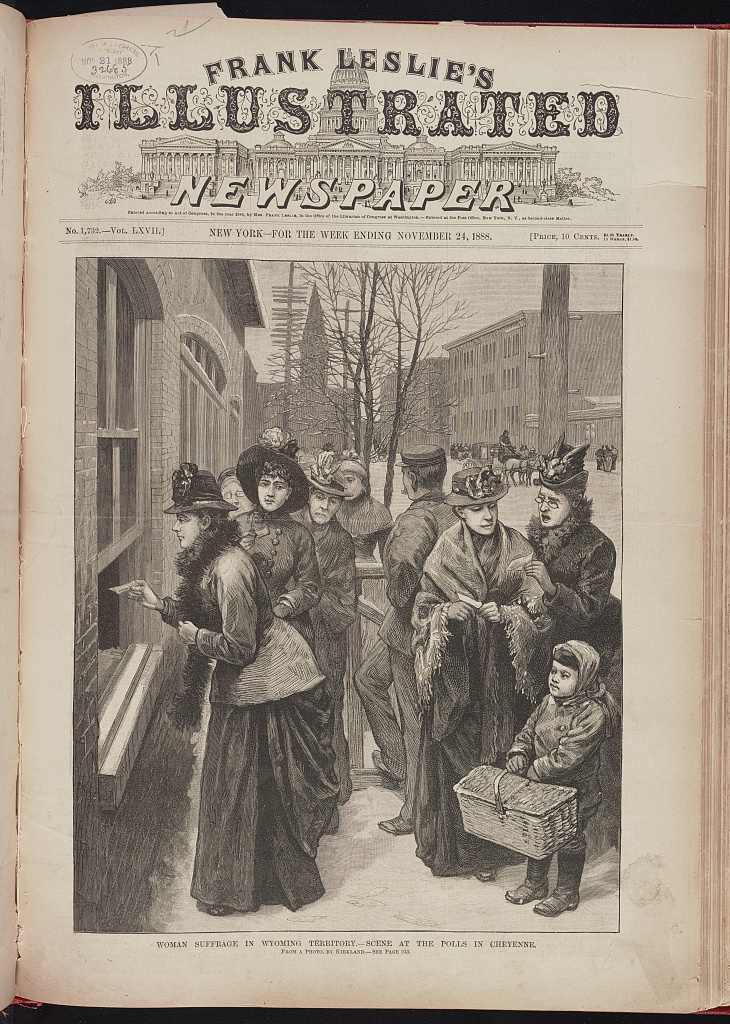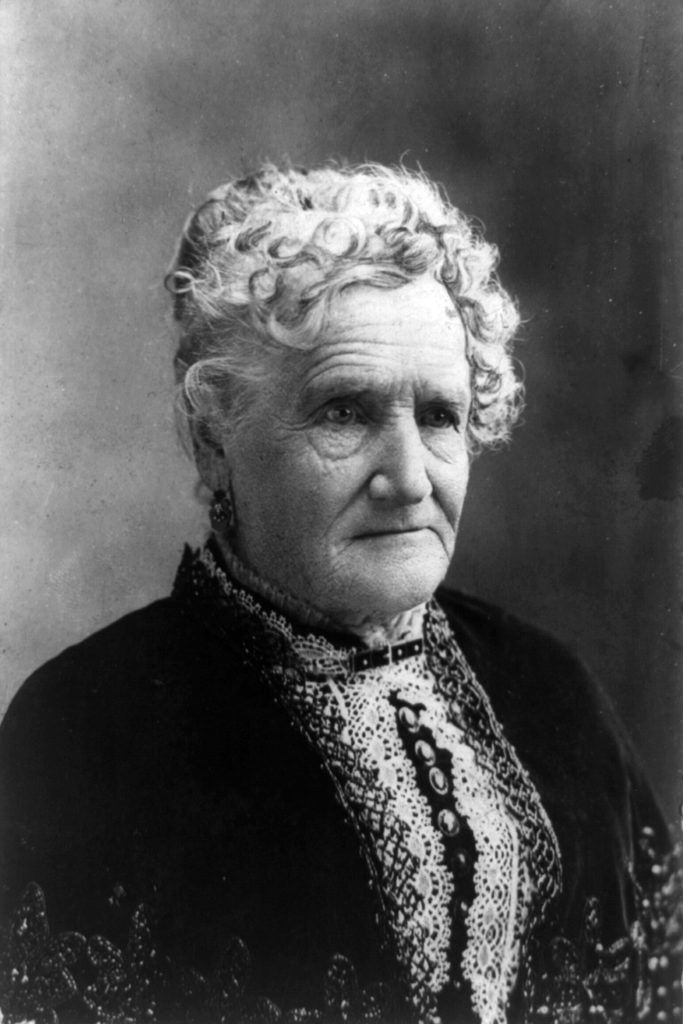December 10, 1869
Celebrate the 100th anniversary of the 19th Amendment with stories about the people and events that led to the passage of women’s suffrage in the United States.
One hundred and fifty years ago this week, Wyoming made a significant – though complicated – stride on the path toward women’s suffrage.
On December 10, 1869, the frontier territory became the first to explicitly grant women the right to vote when governor John Campbell approved “An Act to Grant to the Women of Wyoming Territory the Right of Suffrage and to Hold Office.”
Wyoming Territory
Wyoming had been founded as a territory in July 1868, a time when post Civil War Reconstruction politics determined much of the legislative landscape.
President Grant appointed an almost entirely Republican government in 1869, including the territory’s governor, secretary, and attorney general. These “Radical Republicans” were named after their support for and passage of the 14th Amendment - guaranteeing that former slaves would be citizens and protected equally under the law - and the 15th Amendment - guaranteeing that individuals could not be denied the right to vote based on race or previous slave status.
The question of women's suffrage was also being raised throughout American politics. Suffrage bills in the Washington, Nebraska and Dakota territories had failed in the 1850s and 1860s, as had constitutional amendments that would have granted women the right to vote.
William Bright
The Wyoming bill was introduced by (among others) a saloon keeper turned territorial legislator originally from Alexandria, Virginia. William Bright had fought for the Union Army during the Civil War, and later found his way to Wyoming during the gold rush, where he settled in South Pass.
Bright began his foray into the political scene as a Democrat. Like many of his fellow Democrats after the Civil War, Bright disagreed with the "Radical Republicans" and President Ulysses S. Grant in regards to Reconstruction, and had been known to speak out against them - but he appears not to have opposed the issue to women's suffrage.
Photo of the suffrage bill.
Library of Congress Prints and Photographs Division.
Despite Wyoming's "Radical Republican" leadership - attorney general Joseph Carey issued an official legal opinion emphasizing the 15th Amendment’s stipulation that no one (man) could be denied the vote on the basis of race - in the September 1869 territorial election only Democrats were elected to the legislature. Wyoming’s delegate to Congress that year was a Democrat.
William Bright was among the Democrats elected to the upper house of the Wyoming legislature (referred to as the Council) and subsequently appointed as president of the Council.
This legislature soon produced a significant series of laws in favor of women’s rights, including a resolution allowing women to sit in on legislative proceedings, a law guaranteeing teachers be paid equally no matter their gender, and a bill ensuring that married women could have property rights independent of their husbands.
“Scene at the Polls in Cheyenne,” 1888.
Library of Congress Prints and Photographs Division.
The Wyoming Bill
Bright’s suffrage bill followed. Upon introducing the bill, it passed in the Council 6-2. In the House, it faced more pushback. Attempts were made to sabotage the bill through racial prejudice, including by adding an amendment to extend the right to vote to women of color. This amendment was not added to the final bill.
One amendment that did prevail was to raise the voting age for women from 18 to 21. After this addition, the suffrage bill passed 7-4 with one abstention. Governor Campbell signed the bill into law a few days later.
No records were made of the actual proceedings of the legislative session that resulted in the bill’s passage, but newspaper reports reflect a nearly humorous atmosphere accompanying this historic legislation, suggesting that the bill itself may have been perceived as a joke. The Cheyenne-based Wyoming Tribune reported that “amid the greatest hilarity, and after the presentation of various funny amendments and in the full expectation of a gubernatorial veto, an act was passed enfranchising the women of Wyoming.”
Mrs. Esther Morris, the 1st woman judge in Wyoming Territory.
Library of Congress Prints and Photographs Division.
Getting the Vote for Women
Though the exact details of what other events directly precipitated the suffrage law are unclear, one frequently-referenced 1926 account credits South Pass resident Esther Hobart Morris as its catalyst.
Morris purportedly hosted a tea party as a forum to present her case for women’s suffrage to legislators, allegedly including Bright. While Morris’s actual role in the bill has been contested, it is notable that following the 1869 passage of the suffrage law, she became the first female justice of the peace in the United States (taking over after her predecessor resigned in protest of the new law).
In September 1870, Wyoming women formally voted in their first election and the territory’s second. On September 6, sixty-nine-year-old Louisa Swain of Laramie, Wyoming, became the first woman in the country to democratically cast a vote. About 300 of the total 600 eligible women voted, and many selected Republicans on their ballots. A Republican took over the position as delegate to Congress, and by 1871 a swath of Republicans broke into the previously Democrat-dominated legislature.
However, all was not smooth sailing in this new era: the newly elected legislature soon passed a bill to repeal the 1869 law, which was vetoed by Governor Campbell, whose veto was then overridden by a two-thirds vote in the House. Once it reached the Council, the bill then failed by one vote, and the suffrage law stood, never to be challenged again.
Why Women's Suffrage?
Various theories have been proposed as to the motivations behind passage of the bill, which at the time was a radical decision.
Was suffrage a publicity stunt designed to bring more settlers (and female settlers in particular) to the territory? In 1869 Wyoming was comprised of only about 6,000 recorded adult men and 1,000 women. It was also the most recently designated territory, and quite remote.
Was the bill a political power move to keep the Democrats in territorial power? Added to any possible political maneuvering was the potential for a reactionary veto by the Republican governor - had that happened, it would have been an embarrassing blow to Campbell and a boon to the Democrats.
Was the bill a sign of the schism growing between the abolitionists/Reconstructionists and the suffragists? Some of the Wyoming legislators argued that white women should have the vote instead of the African-Americans enfranchised under the 15th Amendment, or that they should be prioritized in the steps toward universal suffrage. The divide between those in support of the 15th Amendment and those against it would prove to be significant in the suffrage movement, with famous suffragists such as Elizabeth Cady Stanton and Susan B. Anthony opposing the enfranchisement of African-American men. This divide came to define much of the suffrage movement itself.
The Equality State
Despite the questionable motives surrounding this landmark day, Wyoming – which was later nicknamed “the Equality State” – continued its progressive legislative streak, and in 1889 approved the country’s first state constitution granting full voting rights to women.
In 1924, the state garnered another national first when Nellie Tayloe Ross was elected the first female governor in the United States.
2020 marks the centennial of women’s suffrage in the United States.


